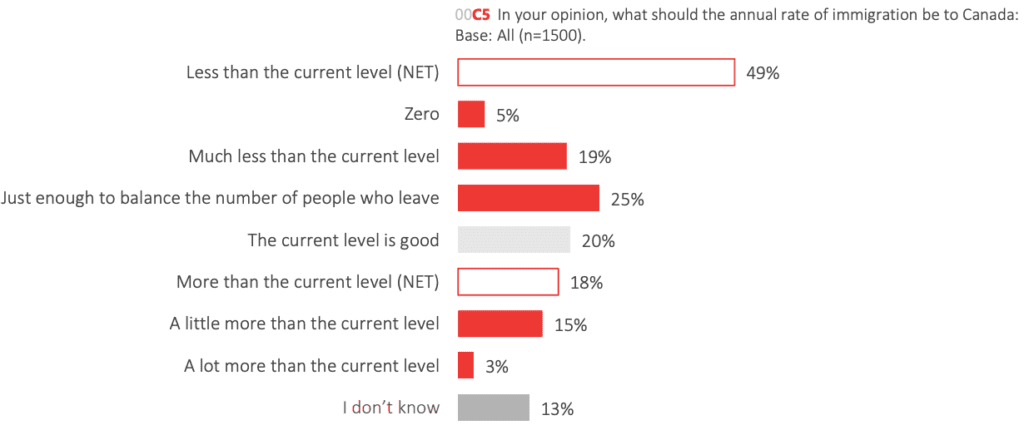A Nanos poll for the Globe and Mail found that 53% of Canadians want the federal government to accept fewer immigrants than the projected 2023 target of 465,000 permanent residents. This is a rise of almost 20 percentage points since March, when only 34% of respondents wanted lower immigration. Just over a third of respondents support current immigration levels, while just 8% think Canada should accept more immigrants.
The poll also found that 55% of Canadians want Canada to lower the number of international students, which is expected to reach 900,000 this year. Just under a third of respondents supported the current number of international students, while 7% thought we should accept more.
Nik Nanos, chairman of Nanos Research, attributes rising support for immigration restriction to the astronomic rise in housing costs driven by Canada’s immigration-fuelled population growth:
“Regardless of Canada’s tradition of welcoming newcomers, there is a reality that people are wondering where the new people will live and what it might mean in terms of even more pressure on housing.”
The Nanos poll showed that the Prairies are the country’s bastion of support for immigration restriction, with a resounding 61% of respondents wanting lower numbers. Only 43% of respondents in British Columbia supported lower numbers – however, this percentage is probably distorted by high support for immigration in Vancouver, which is 41.8% foreign-born. I would be curious to see how the rest of the province feels.
Interestingly, Québec registered the highest support for lowering international student numbers: 59.7%. In light of this result, Québec Premier François Legault may want to rethink his opposition to the international student cap floated by federal Housing Minister Sean Fraser.
The last six months, during which support for immigration restriction has climbed so dramatically, has seen serious discussion on the topic reach the mainstream media for the first time in decades. Almost every day, there was a new op-ed criticizing Trudeau’s immigration policy from a different angle. Just take a look at the Globe and Mail’s list of immigration related columns.
Canada has long been seen as an exception to the West’s turn towards populism, and our supposedly unwavering support for immigration has been held up as the prime example of this. In reality, support for immigration restriction has long been simmering, kept quiet by a political class which has long refused to broach the topic and a cancel culture which viciously attacked public figures like Don Cherry who dared question the narrative.
However, the generous good will of a kind-hearted population has reached a breaking point, with a 20-point shift towards immigration restriction in six months. As the housing crisis continues to accelerate, and social cohesion in our large cities continues to break down, it is safe to predict that public opposition to large-scale immigration will continue to grow.
Immigration restrictionism is rising. The first mainstream politician to reflect this groundswell stands to gain the grateful support of the population. But who will be brave enough to break Canada’s immigration taboo?
All content on this website is copyrighted, and cannot be republished or reproduced without permission.
Share this article!




The truth does not fear investigation.
You can help support Dominion Review!
Dominion Review is entirely funded by readers. I am proud to publish hard-hitting columns and in-depth journalism with no paywall, no government grants, and no deference to political correctness and prevailing orthodoxies. If you appreciate this publication and want to help it grow and provide novel and dissenting perspectives to more Canadians, consider subscribing on Patreon for $5/month.
- Riley Donovan, editor